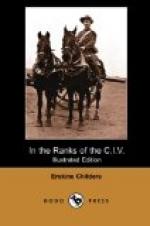At half-past twelve we were at the station, where the guns had already been entrained by a fatigue party. Ours was the first of three trains, and was to carry the Battery, and two companies of Infantry. Williams and I secured a small lair underneath a limber in an open truck, and bundled in our kit. The platform was crowded with officers and Tommies, and many and envious were the farewells we had. Kilsby, of T Battery, whom I had made friends with at the barracks, was there to see me off. At 4.30, amidst great cheering, we steamed out and began the thousand mile run to Capetown, slowly climbing the long wooded pass, under an angry, lowering sky. At the top a stormy sun was setting in a glowing furnace of rose-red. We hastily rigged some tarpaulins over our limber, and escaped a wetting from a heavy shower. We had managed to distribute and compress our kit so as to leave room to lie down in, and after dark we lit a lantern and played picquet. About eight we came to Elandsfontein, and there on the platform were my brother and Major Burn-Murdoch. The latter hurried us off to the restaurant—forbidden ground to us men as a rule, sat us down among the officers, and gave us a rattling good dinner, while our comrades munched their biscuits outside. De Wet, we heard, was ahead, having crossed the line with 1000 men, two nights ago, further south. We agreed that it would be a happy irony if he held up our train, the first to carry troops homeward—the herald of peace, in fact; and just the sort of enterprise that would tickle his fancy. Suddenly the train jerked off, and I jumped into my lair and left them. It was a warm night, and we sat under the stars on the seats of the limber, enjoying the motion and the cool air. About ten we pulled up at a station, and just after we had stopped, four rifle-shots rapped out in quick succession not far ahead. De Wet, we at once conjectured. In the darkness on our left we heard an impatient corporal turning out his sleepy guard, and a stir and clatter of arms. One of our companies of infantry was also turned out, and a party formed to patrol the line, outposts having reported some Boers tampering with the rails. The rest of the train was sound asleep, but we, being awake, got leave to go with the patrol. Williams borrowed a rifle from somewhere, but I could not find a weapon. They made us connecting files between the advance party and main body, and we tramped up the line and over the veldt for about an hour, but nothing happened, and we came back and turned in.
De Wet let us alone, and for five days we travelled peaceably through the well-known places, sometimes in the pure, clear air of true African weather, but further south through storms of cold rain, when Scotch mists shrouded everything, and we lay in the bottom of our truck, on carefully constructed islands of kit and blankets, among pools of water, passing the time with books and cards. Signs of war had not disappeared, and at every station down to Bloemfontein were the same vigilant camps (often with parties posted in trenches), more charred remains of trains, and ever-present rumours of raiding commandos.




